Wednesday morning was a bit more chaotic than usual as our growing group was breaking off to go to four different locations. John and Sandra Hurlbert were going with Vincent and Joe to begin working on the installation of solar panels and lights at the Chimpeni and Sakata Schools, Trudi and Sydney were finishing teaching their last week of science classes, while Liz and Stephen were driving to Blantyre to pick up the rest of the second Friendship Team. That left Jordan, Terra and me with the chance to spend the day with VIP translator, and dear friend of the Heinzel-Nelson girls, Violet Matimati. We met Violet at the base of N’amingazi Farm and took a minibus to Zomba town, where we would be picking up ingredients for Mandazi, the local fried dough snacks that every friendship team seems to quickly become addicted to, which Violet would be showing us how to make. After picking up the ingredients we walked from Zomba town to Violet’s house. The walk was beautiful for a while, as we made our way along avenues of trees, which largely lay on government property, and thus had been protected. After a mile or so the trees abruptly vanished and we found ourselves walking through a densely packed neighborhood. Without the benefit of a sanitation department and lacking the space and fuel to make regular rubbish fires, the neighborhood was choked with trash. Plastic bottles and bags were piled several layers deep in the ditches which lined the dirt path that cut its way between houses, stores and barber shops. After several more minutes of walking we arrived at Violet’s house. The girls had not yet been to Vi’s new house and we were all very impressed. Violet had recently worked for one of our partner organizations distributing food relief in the aftermath of last year’s terrible drought and her husband, Blessings, who is the brother of VIP employee Daniel Bonongwe, had recently returned from South Africa, where he had earned money as a driver and working other odd jobs. This surge in income had allowed them to upgrade to this new house, with electricity and a water point in the backyard.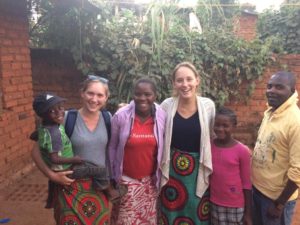
As we walked up to Violet’s house we received shy hugs from her two kids, 10 year old Trinity and three year old Luka. Terra, who is like a sister to Violet, had given Luka his name and was shocked by how big he had grown, and both Jordan and Terra were happy to see what a lovely young lady Trinity had become. We spent the afternoon with the young family, playing cards, making Mandazi and catching up on the developments in their lives. Blessings told us that he was thinking of going back to South Africa to try to find work. There were no jobs to be had in Malawi he told us, and so thousands of young men migrate to South Africa trying to find work and earn a living for themselves and their families. Because they are so desperate for money, Malawians are willing to work longer hours, for less money than many South Africans. This has led to claims by the South Africans that Malawians are coming in to their country and stealing jobs. As a result Malawians often encounter bitter prejudice when they migrate to South Africa, and face the possibility of being arrested and deported by the South African Authorities if they stay too long, or being run off by mobs if they are caught in the wrong neighborhood. But his family needs to eat and so Blessings will make the risky trip down to South Africa again sometime soon, and so will thousands more like him until the day that Malawi has enough jobs for all of her people.
Far too soon, it was time to say goodbye to the kids and walk back with Violet and Blessings to catch a taxi to the farm. With full hearts (and stomachs) we hugged them goodbye and less than an hour later we found ourselves walking the last few feet up to the dining hall, after our taxi had run out of gas on the hill leading up to the farm. We arrived just as the second Friendship Team sat down for their first dinner together. This second team was much larger than the first, and as we sat down at one of the long tables in the dining hall we numbered 17. Six of the new team members were from the quickly expanding “Texas Chapter” of VIP that Randa Nelson has been building since her first time in Malawi in 2010. John and Sandra Hurlbert are members of Randa’s former church just outside Dallas, and John in particular was excited to begin work on the new solar projects, a passion of his, at the Chimpeni and Sakata Schools.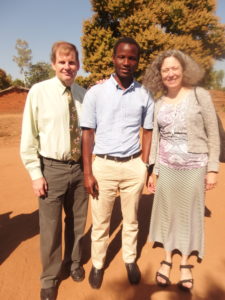 Joining them from Texas were the four Andersons, Gayle, Phil, John and Nicole, who had come to Malawi four years ago, again at Randa’s urging, and who were coming back as a family for the first time since then. Gayle had been so moved by everything that she had seen and experienced on her first trip to Malawi with VIP, that she quickly became a Board Member, and has been an indispensable asset to VIP since then, using her years of experience as the CFO of major companies to expertly steer our Finance Committee.
Joining them from Texas were the four Andersons, Gayle, Phil, John and Nicole, who had come to Malawi four years ago, again at Randa’s urging, and who were coming back as a family for the first time since then. Gayle had been so moved by everything that she had seen and experienced on her first trip to Malawi with VIP, that she quickly became a Board Member, and has been an indispensable asset to VIP since then, using her years of experience as the CFO of major companies to expertly steer our Finance Committee.
Gayle was not the only Board member joining us on this trip, Kim Huchro and her daughter Tory had come as well, from their home near New York City. Kim’s husband Paul was one of Stephen’s Fraternity brothers and their family had visited Malawi with VIP in 2009. Everything they had seen and experienced on that trip had a big impact on them and they have been deeply involved with VIP since then. Tory in particular had fallen in love with the people and the land of Malawi and was now, along with her Mom, making her 4th trip here with VIP.
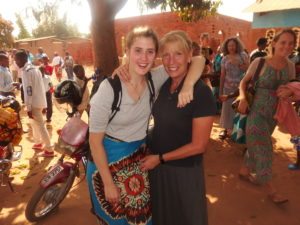
Robbie Ytterberg, the new Pastor at the Presbyterian Church of Toms River, one of VIP’s oldest church partners, whose partnership had helped us expand out catchment area beyond our original 16 villages, was also with us. Robbie had come to see for himself the work that VIP was doing and to understand why so many in his church had such a close connection to our mission.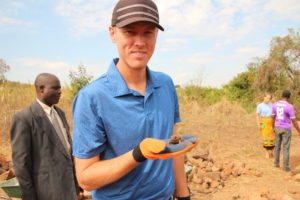 Hailing from even closer to home was his roommate Enoch Smith Jr. Enoch is the music director at Allentown Presbyterian Church, where Stephen is the pastor and where the VIP offices are located. In addition to his role with the church Enoch is a professional musician and music producer and he had come to Malawi to organize a large choir competition and to connect with our Malawian friends through the universal language of music.
Hailing from even closer to home was his roommate Enoch Smith Jr. Enoch is the music director at Allentown Presbyterian Church, where Stephen is the pastor and where the VIP offices are located. In addition to his role with the church Enoch is a professional musician and music producer and he had come to Malawi to organize a large choir competition and to connect with our Malawian friends through the universal language of music.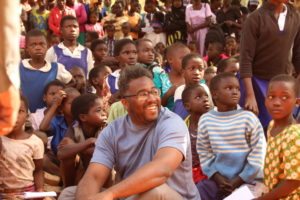 Rounding out our team was my new roommate, Hastings Machingili. Hastings is a child of two worlds, born in the United States to Malawian parents, he has spent large parts of his life in both countries. His father, Ramsey, is a successful Malawian businessman with a real heart for the work of VIP. Ramsey has partnered with VIP many times over the years, most recently as the renter of the VIP built maize mill, to help ensure that the mill is run efficiently and for the benefit of the community, while also providing income to VIP, which can be fed back into community projects, like building, and purchasing supplies for, CBCCs, which will be discussed in some detail below.
Rounding out our team was my new roommate, Hastings Machingili. Hastings is a child of two worlds, born in the United States to Malawian parents, he has spent large parts of his life in both countries. His father, Ramsey, is a successful Malawian businessman with a real heart for the work of VIP. Ramsey has partnered with VIP many times over the years, most recently as the renter of the VIP built maize mill, to help ensure that the mill is run efficiently and for the benefit of the community, while also providing income to VIP, which can be fed back into community projects, like building, and purchasing supplies for, CBCCs, which will be discussed in some detail below.
After a candlelight dinner and a meeting reviewing the week’s itinerary, our jetlagged team went to sleep early and woke up refreshed the next day. The larger team required us to break up into several small groups during the day to attend the various projects underway, so that everyone would have a chance to work. While the splintering of the group required 4 vehicles and a lot of organization by Liz and the staff, it also provided a great opportunity to showcase everything that VIP was involved in. One group was going to an “open day” at a local CBCC, or Community Based Childcare Center. VIP supports 15 CBCCs throughout our Catchment area, ranging from impressive brick structures that we helped build, to small thatched grass huts put up by the community.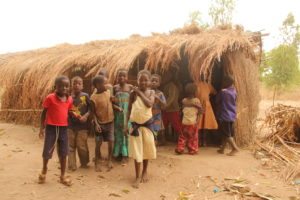 Regardless of what they look like from the outside, CBCCs are some of the most important structures anywhere in Malawi. Studies show that human brain development and growth is most rapid and vulnerable from conception to age 5, and is largely influenced by aspects such as nutrition, caregiver interactions and household environment. As a result, the experiences and interactions of children during this period fundamentally shape their growth and lifelong prospects, making early childhood the most critical period of human development. Failure to develop properly during early childhood can lead to long-term, sometimes irreversible effects. Unfortunately, Malawi does not have a nation-wide pre-school program. So most children in Malawi are not receiving the stimulation and interactions they need at this critical point in their lives. That is why VIP is partnering with, supplying, and helping to organize more local CBCCs. CBCCs are run by community members, usually the mothers of young children who are volunteering to help out, and they serve as de-facto preschools to help ensure that children develop properly and receive the mental, social and physical stimulation they need to reach their full potential in life.
Regardless of what they look like from the outside, CBCCs are some of the most important structures anywhere in Malawi. Studies show that human brain development and growth is most rapid and vulnerable from conception to age 5, and is largely influenced by aspects such as nutrition, caregiver interactions and household environment. As a result, the experiences and interactions of children during this period fundamentally shape their growth and lifelong prospects, making early childhood the most critical period of human development. Failure to develop properly during early childhood can lead to long-term, sometimes irreversible effects. Unfortunately, Malawi does not have a nation-wide pre-school program. So most children in Malawi are not receiving the stimulation and interactions they need at this critical point in their lives. That is why VIP is partnering with, supplying, and helping to organize more local CBCCs. CBCCs are run by community members, usually the mothers of young children who are volunteering to help out, and they serve as de-facto preschools to help ensure that children develop properly and receive the mental, social and physical stimulation they need to reach their full potential in life.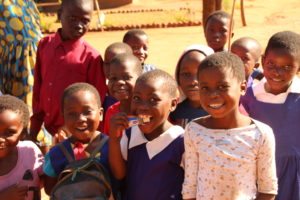
While one team went to the CBCC open house, a second group was going to make more bricks, priceless tools for the ongoing VIP construction projects, and Phil Anderson would be joining John Hurlbert on the installation of the solar panels and lights at the schools. This left my group to head to Mphero village to work with a group of farmers who were practicing small scale irrigation. Mphero is located on the banks of the Naisi River, and the field that Robbie, Jordan, Frank Mwenjemeka, Isaac Mwalabu, Sydney Chikilema and I walked to from the Landcruiser was less than 100 yards from the river. We were greeted by ten of the farmers who were part of a VIP run irrigation program and we listened as the lead farmer explained to us what they were doing.
The vast majority of Malawians rely on one harvest a year, at the end of the rainy season in March and early April. The rest of the year is far too dry to grow anything without the aid of irrigation, an expensive luxury that is not currently an option for most individual Malawians. But VIP wanted to take advantage of the nearby river to help farmers grow crops during the dry season. So we found a group of farmers who were interested in working during the dry season and organized them into a collective that would rent a piece of land for half the year (the land owner was a member of the collective and had provided the land at an incredibly generous price). The group was provided with a treadle pump by VIP, which they would then use to irrigate and farm the land collectively, using a strict attendance system to make sure that everyone did equal work. When the crop (in this case maize) was ready to harvest they would sell it all at once at the market, in order to have more bargaining power, and then divide the profits amongst themselves, while retaining some capital for the group as a whole to buy fertilizer and other necessary materials for the next season.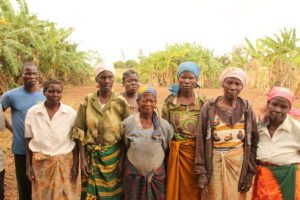
It was an impressive operation, overseen with care and precision by my good friend Frank Mwenjemeka, VIP’s Agricultural Officer. But even more impressive was the amount of work that the farmers had to put in everyday in order to make it profitable. When we got to the field, the 100 plus raised beds had all been made already and many of them had already been planted and fertilized. After just a few minutes of bending down over the beds, measuring the distance between holes and planting the seeds and adding the fertilizer, our team was ready for a break. But we still hadn’t gotten to the hard part, pumping the water using a treadle pump (think a barebones Stairmaster that uses human leg power to create suction to draw water along a hose) to irrigate the raised beds.
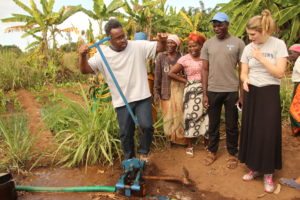
While the river is nearby, the field lies uphill from the Naisi, and so pumping the water takes a great deal of energy. Our team decided on a system where we would each pump as hard as we could for 30 seconds before stepping off the pump and allowing the next person in line to go. This seemed to be the most efficient method, we could tell by checking the pressure of the water shooting out from the various leaks along the hose line, but after twenty minutes or so we were all exhausted and Frank called for a break. We walked around the grove of banana trees separating the river from the field to see how much of the field we had irrigated, and were disappointed to find that we had only watered 5 or 6 beds.
We rested for a while and enjoyed a cup of thobwa, a grainy, fermented Malawian drink made from white maize and millet or sorghum, with Frank. I had heard some horror stories of drinking thobwa from people who had been to Malawi before, including from an unnamed VIP Board Member who had been given a particularly strong batch of thobwa that they felt they couldn’t keep down, so rather than risk offending anyone by not drinking it, the Board Member had “accidentally” spilled their drink. Seeing this, their Malawian hosts had sympathetically refilled the cup not wanting them to miss out on a drink that is widely loved in Malawi. We fortunately had a mild batch, and as I drank it with Frank in the shade of the banana trees I felt my energy returning for another go at the treadle pump.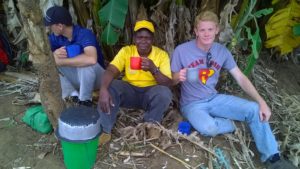 Joined by Enoch and Tory, who had come from the CBCC open house, our group spent another 20 minutes pumping at an unsustainable pace, and when Liz finally arrived to take us to the rest of the team at the Sakata School, we had watered less than 10% of the field. As we said our goodbyes to the farmers we began to realize how difficult this was for them. Only one farmer was a man, and the majority of the women, smiling across from us in thanks, were in their 60’s and 70’s, an age where they should have been sharing their wisdom with younger generations, not doing backbreaking labor in the fields. If our group of young, reasonably fit people, could only water a tenth of the field while working at breakneck pace, how hard must it be for these older women to inundate the entire field once a week? Before we left Frank wanted us to see some of the fruits of the hard work that the farmers had been putting in over the last two years. He took us to the house of one of the younger women in the collective. She had a thatched roof on her house, which leaked terribly during the rainy season.
Joined by Enoch and Tory, who had come from the CBCC open house, our group spent another 20 minutes pumping at an unsustainable pace, and when Liz finally arrived to take us to the rest of the team at the Sakata School, we had watered less than 10% of the field. As we said our goodbyes to the farmers we began to realize how difficult this was for them. Only one farmer was a man, and the majority of the women, smiling across from us in thanks, were in their 60’s and 70’s, an age where they should have been sharing their wisdom with younger generations, not doing backbreaking labor in the fields. If our group of young, reasonably fit people, could only water a tenth of the field while working at breakneck pace, how hard must it be for these older women to inundate the entire field once a week? Before we left Frank wanted us to see some of the fruits of the hard work that the farmers had been putting in over the last two years. He took us to the house of one of the younger women in the collective. She had a thatched roof on her house, which leaked terribly during the rainy season.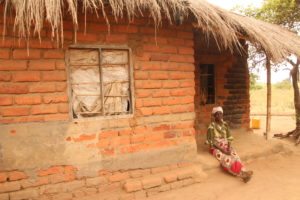 During those three or four months, which ironically helped to sustain most of her fellow villagers, she and her children lay bundled up together on the floor in one corner of the house, trying to stay dry and away from the pools, puddles and streams that formed across most of their home. As we walked inside we saw several large sheets of metal in one corner of the main room. We asked her what they were and she told us that she was using the money she was earning from being a part of the irrigation collective to buy pieces of sheet metal for a new iron roof. She told us that she should have enough pieces by next year to finish the roof and that soon her family would not have to deal with puddles of water inside their home.
During those three or four months, which ironically helped to sustain most of her fellow villagers, she and her children lay bundled up together on the floor in one corner of the house, trying to stay dry and away from the pools, puddles and streams that formed across most of their home. As we walked inside we saw several large sheets of metal in one corner of the main room. We asked her what they were and she told us that she was using the money she was earning from being a part of the irrigation collective to buy pieces of sheet metal for a new iron roof. She told us that she should have enough pieces by next year to finish the roof and that soon her family would not have to deal with puddles of water inside their home.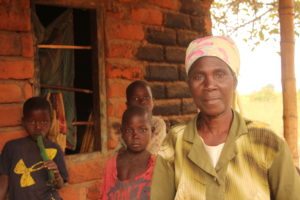
It was a great way to finish our day. To work on a project that VIP had funded and created, to see and feel how hard our partner villagers had to work, and then to see the tangible benefits of the project on the life of someone involved. As we said our goodbyes I realized that this project was exactly how development should work. VIP had come in at the request of the village and had provided a group of hardworking villagers with organization, training and funds. But the project had now become self-sustaining. If Frank never came back to check on the irrigation collective it would still continue to operate every year, perhaps even more efficiently if their savings allowed them to purchase a gas powered-generator for the pump to ease the burden on the aging group. And as the farmers in the group grow wealthier and the benefits of the project become more evident, other groups will learn from this group and begin to create other groups modeled on them. And so the seeds planted by VIP will continue to spread, lifting up the community person by person, group by group, village by village.

Leave a Reply